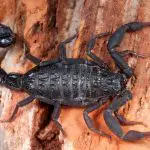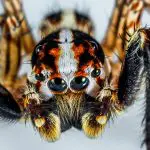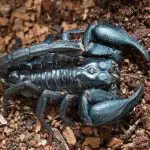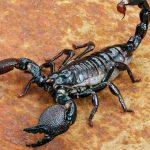Last updated on August 25th, 2022 at 11:57 am
How Long Do Scorpions Live Without Food? They go a long time, but like a lot of animals, it depends how big the scorpion is. Let’s find out more…
How long do scorpions live without food? Most of the time, scorpions live for up to several weeks without eating. Very healthy adults can go for as long as a year, however. But what about a scorpion in captivity? How do they eat and survive? How long can baby scorpions live without food? Read on to find out!
How long can a baby scorpion go without food?
Unlike adults, baby scorpions can only go between a few days and a week without food. This is because of how fast they are growing. As a general rule, scorpions are best fed live insects, such as crickets, grasshoppers, moths, and mealworms.
Be sure to keep your scorpion in a properly vented tank and always have some kind of food available for them at least twice a week when they are babies. When young and growing rapidly, they need to eat more than adults, which have a very slow metabolism.
While some species can live for several months without eating, others can survive up to a year without eating – but only once they’ve reach full size. That’s why it’s important to feed your scorpions on a regular basis.
Just like tarantulas, their metabolism is slow, and they can go a long time without eating before it causes them any issues. One scorpion species even managed to go seventeen months without eating.
This is only something they do in the wild to survive though – you should always feed them more often in captivity, and try to give them an easier life all-round.
Ideally, you should feed your scorpions every few of days, but be sure not to disturb them during their pre-molt stage. You may end up damaging your scorpion’s body during this delicate process.
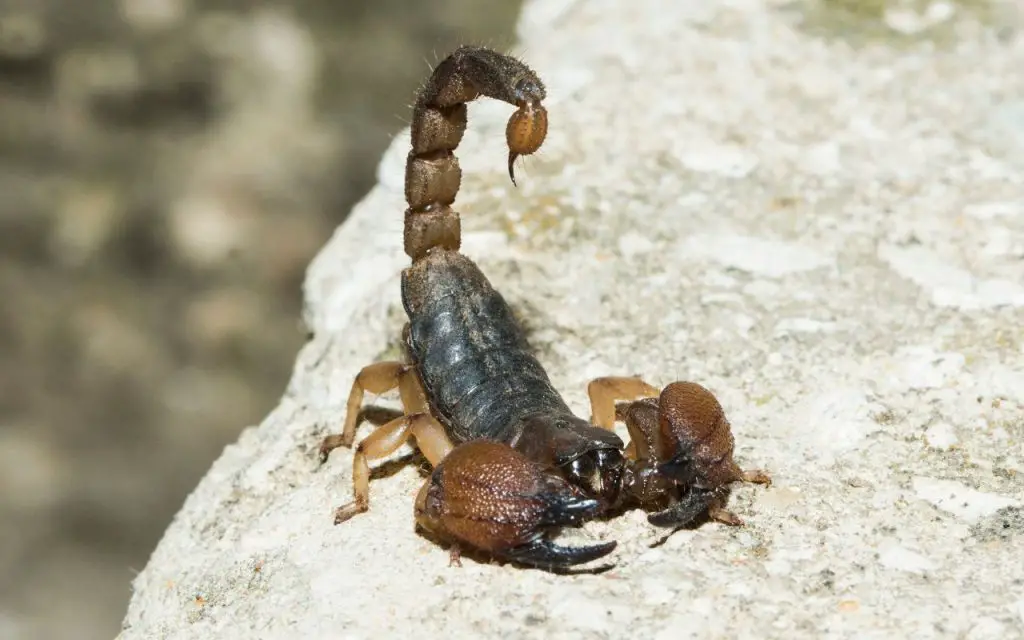
How long can a scorpion live in a jar?
If you’re wondering: “How long can a scorpion live in t a jar without food?” you’re in luck. The question is more than a little bit scientific. In the past, scientists have found that scorpions can live for about 20 days without food.
If you’re planning on keeping a scorpion long-term, however, a jar isn’t recommended, especially if it is young. I say this because a perspex or plastic enclosure will give it more room to roam and hunt. It will also be growing rapidly, and will need a humid spot to molt.
Molting is a delicate process for them, but essential for growth. It’s always important to keep this in mind.
The scorpion’s exoskeleton is made up of a series of protein chains that cross each other. As the animal grows, the exoskeleton becomes stronger and more rigid, allowing it to withstand high temperatures and the occasional knock here and there. In fact, full-grown scorpions are a lot tougher than spiders!
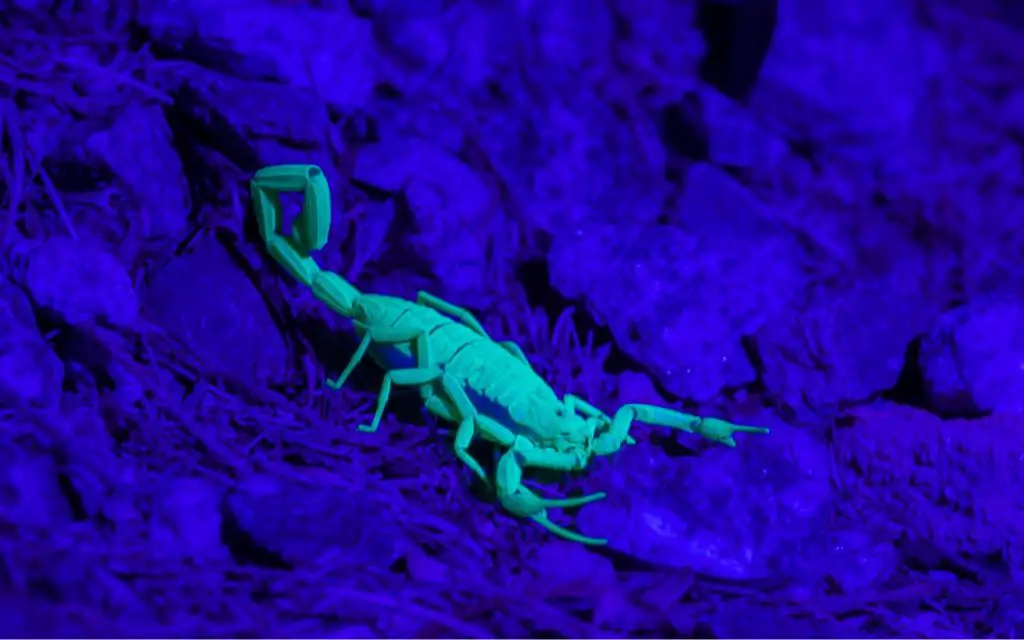
What does a scorpion eat?
Although scorpions primarily feed on insects, they also eat lizards, tarantulas, and mammals. In addition to these prey, scorpions will also occasionally eat earthworms, mollusks, and other animals.
Wild scorpions aren’t fussy, they’ve been seen eating:
- flies
- beetles
- other scorpions
- spiders
- mice
- centipedes
- maggots
- worms
- lizards
- frogs
Their large pincers enable them to grab their prey quickly and dismember it, while their venomous sting starts to pre-digest it for their stomachs. While scorpions’ diets can vary, each species has a different venom, so you will see its prey die more or less slowly, depending on whether it matches what the scorpion’s venom evolved for.
In general, most captive scorpions do well on a diet of:
- Dubia roaches
- crickets
- moths
- locusts
- superworms
- waxworms
- hornworms
- confused flour beetle larvae
Scorpions eat a wide variety of insects. And yes, they can live a long time without any food. What they can’t survive without though is water! Never forget this if you keep one as a pet.
Even though scorpions are dangerous in some regions, they are beneficial to the ecosystem by keeping insect populations low. They are also helpful for gardeners.
Baby scorpions spend the first few days of their lives on their mother’s back, feeding on the yolk sac. Once they molt, they begin eating the same diet as adult scorpions.
Some scorpion mothers bring freshly killed prey to their babies. In case of an absence of prey, they may also feed on their babies. This practice is not unusual.
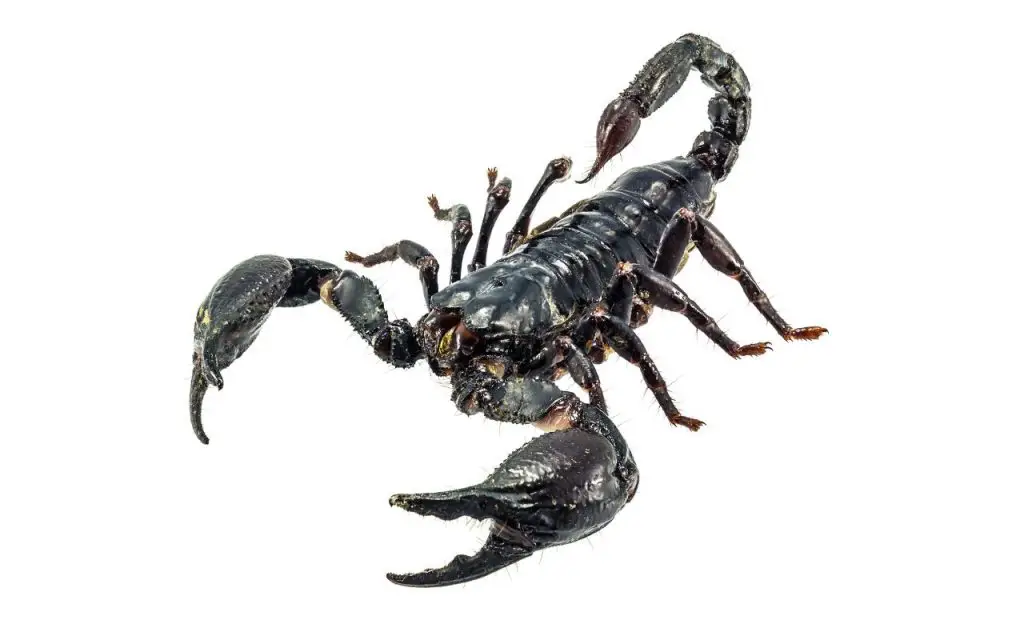
How long do scorpions live in captivity?
Scorpions take well to captivity, and have lived for over tweny years in ideal circumstances. Many species, like the Emperor Scorpion, tend to live closer to 6-8 years as pets, though. One of the most important things to get right to encourage a long, healthy life is of course how often you feed them.
In the wild, scorpions are nocturnal and hunt during the night. That means they cannot eat during the day. This is really one of the few things they’re picky about!
As a result, feeding them at night is natural. A good way to do it is to hold a prey item in front of your pet with some forceps. Some are shy though, so this may not work.
In that case, leave a prey item in the enclosure and watch your scorpion discretely. You may see it eat, or you may have to leave it for a few hours in private.
Whenever possible, try to avoid touching their tail when introducing prey as this will startle them. This will make it less likely for them to sting you or get frightened off eating.
Unless their habitat is extremely dry, scorpions can live a long time without eating. Unsurprisingly, giving them food every day can cause them to grow too quickly between molting seasons.
In fact, feeding them too often will lead to obesity and an oversized exoskeleton. If you do find your scorpion looks like it’s about to burst, it’s time to review how much you’re feeding it!
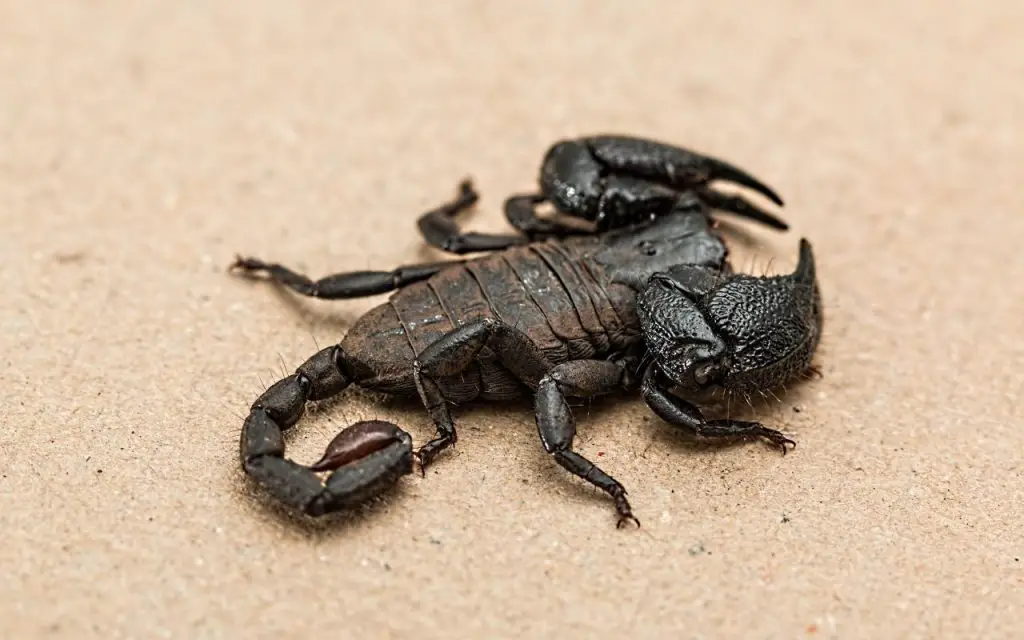
Scorpion eating food
While these animals are nocturnal, they still have the ability to catch and eat their prey. They have excellent senses, and can detect the vibrations from prey walking past them.
When this happens, they grab the prey item incredibly quickly with their pincers and deliver a sting to finish it off. They then begin the process of mashing and externally digesting it.
To do this, scorpions expel enzymes through their fangs that break down insect matter before entering the scorpion’s body. The enzymes help them obtain the maximum amount of nutrients from the prey, while reducing the energy needed for internal digestion.
Because scorpions are nocturnal predators, they can go for months without food, even a year. They typically eat insects, spiders, and other arthropods, though some larger species have also been known to feed on mice and lizards.
While scorpions do not eat every day, they can go for extended periods without food. Their ability to live without food is a testament to their hardy nature.
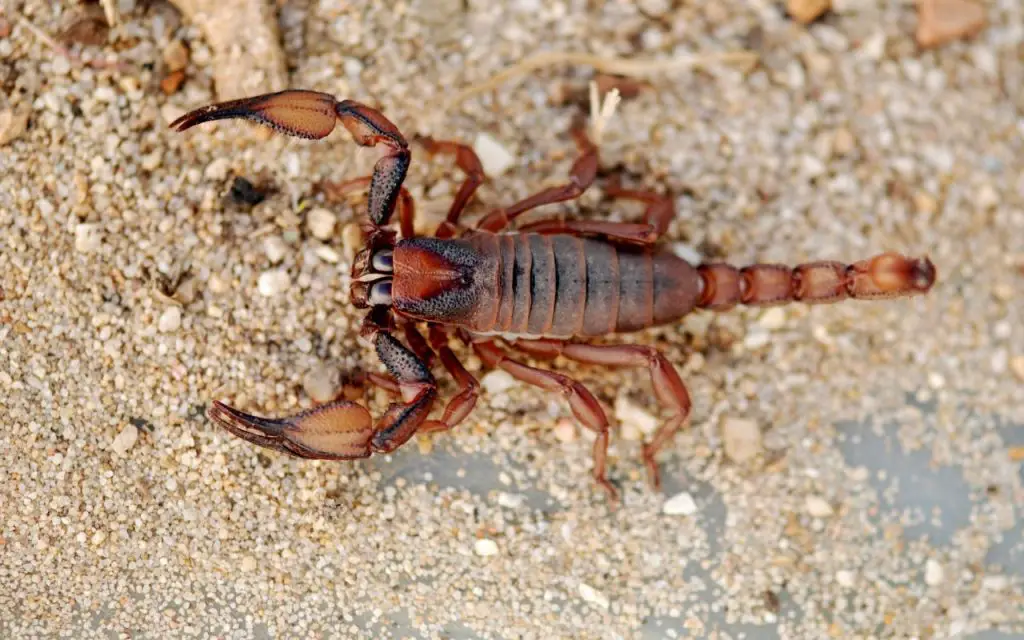
How often should you feed scorpions?
The answer depends on the species you have. However, scorpions do not require a lot of food, and only need two or three meals per week.
To feed your scorpion, you can stop by a pet store on your way home and purchase a few mealworms or crickets. Depending on your species, your scorpion may also eat superworms and other insects that are considered safe by experienced keepers.
It is important to keep the room where your scorpions live at 72 degrees Fahrenheit. You do not have to use a heat pad; simply place your scorpions in a container without a heat source.
If you have a scorpion that likes the temperature of your room, you may not need to feed it every day. But you should always offer food twice a week.
While feeding your pet scorpions every day might sound convenient, most species of scorpions don’t need a daily diet. They can survive on just a few insect meals a week, that only represent around 10% of their body mass. They have a slower metabolism than smaller arachnids, like jumping spiders, for example.
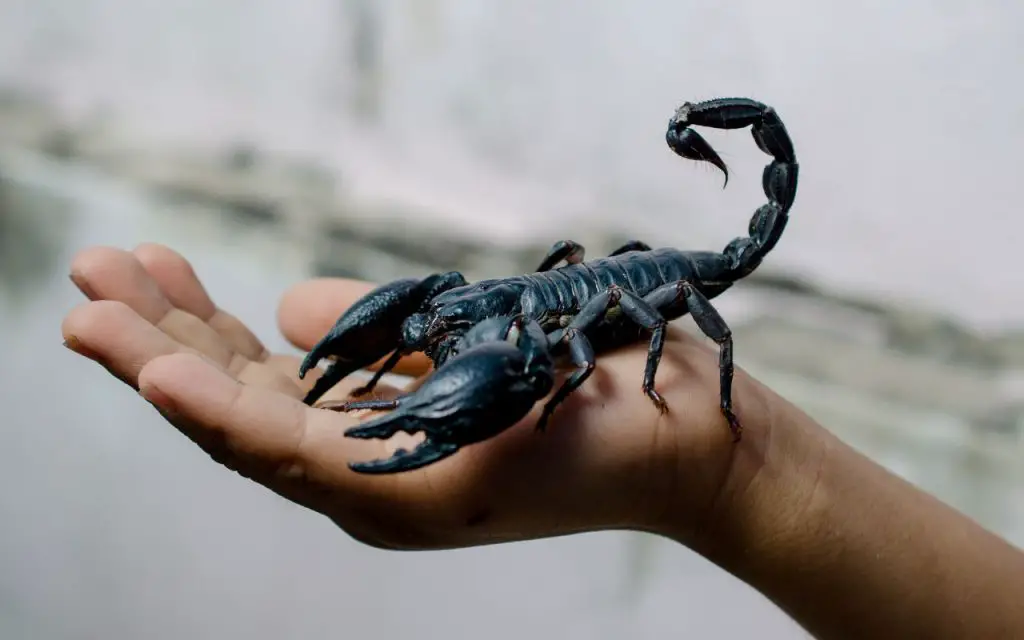
What is a scorpions favorite food?
If you’re looking for the perfect pet, it might be time to ask yourself: What is a scorpions favorite food and what can you feed them? The most common scorpion food is beetles, but they also enjoy eating grasshoppers, centipedes, and even ants!
The variety of scorpion food they eat is incredible, and it may surprise you to know that scorpions have been known to eat spiders!
Because scorpions are opportunistic hunters, they don’t need to hunt for food all day long. They wait for their prey to come to them, and their chelicerae “claws” allow them to tear portions of their prey apart. Afterward, the digestive juices coat their prey, and the scorpion swallows the remainder.
Though it sounds a little boring, most scorpions seem to really enjoy crickets, making them a simple diet to provide, given that they are available in most pet shops.
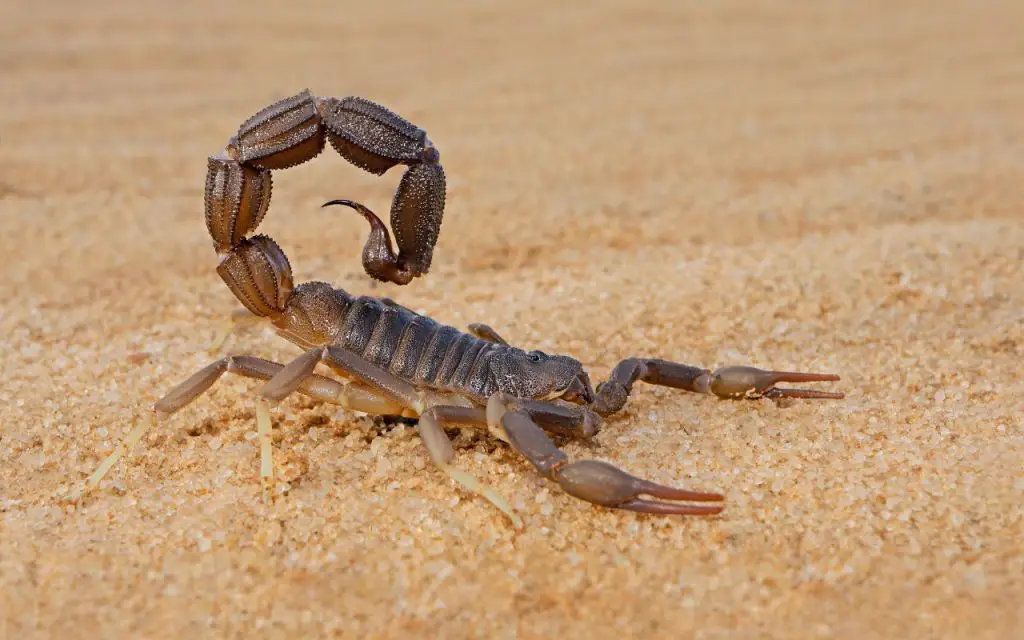
Where do scorpions live?
Scorpions live on every continent except Antarctica. That said, they don’t live as far north as spiders. In North America, for example, they live as far north as British Columbia, whereas spiders can be found all the way to Alaska.
Similarly, in Europe they only range as far north as southern France and Austria – though a small population of Yellow-tailed Scorpions have been introduced to the UK.
In the southern hemisphere, scorpions range as far south as South Africa, Tasmania and Argentina.
Most scorpion species are solitary. They can live up to two years without food, and can survive without water for up to two days. This is because they have fat layers on their exoskeleton that protect them from water loss.
Additionally, scorpions slow their metabolism when food is scarce, and they can survive up to a year without food. However, this doesn’t mean they’re dead.
To keep scorpions from entering your house, make sure your home is free from any gaps or cracks. Avoid leaving out any organic litter, and prune the ground around shrubs and trees.
Don’t leave piles of firewood or rocks around your house, either. You can also place wide-mouth jars under the legs of cribs and tables. Another way to discourage scorpions is to apply petroleum jelly on surfaces that are likely to be frequented by scorpions.

